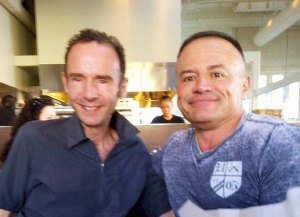Ever since I saw the first poster presentation at the 2007 CROI conference that mentioned his case, I have been wondering what it would feel like to be cured. Until that moment, that thought had never crossed my mind. What would it be like not to have to take pills every day, not to have to worry about side effects, not to have to go see a doctor so frequently, not to have to be afraid of rejection, not to have to spend so much time reading medical information, not to be worried about drug resistance and death, not to feel different from others?
 |
I was happy to have met Timothy Brown this week while shooting my upcoming documentary on the challenges of HIV cure research. This great opportunity not only gave me a chance to get to know him but also to find out more about how it feels to be free of HIV while living in the United States.
Timothy graciously agreed to meet me for an interview in San Francisco, even though he had been asked to do this so many times in the past few months. He showed up dressed nicely in a suit, looking like a handsome businessman ready for an important meeting. I and my friend and camera person Greg Fowler put him through a series of questions, many that he had heard before, yet he kept his candid and approachable attitude throughout the interview while we had glaring lights on his face. I was able to ask him some personal questions about his struggle through his long but successful ordeal.
About a year ago, Timothy moved to the United States from Berlin, where he’d received the chemotherapy, radiation and two bone marrow transplants that got his leukemia in remission and his HIV wiped out of his body. The entire procedure was paid for by the German government. His oncologist and creative thinker, Dr. Gero Hütter, was a great advocate and supporter of his health who did not give up even after the first stem cell transplant failed to control Tim’s leukemia. Tim did not have to worry about his ability to pay for this expensive procedure; it was a benefit of living in a country that provides its people with health care. He is sure that had he been living in the U.S., he would not have fared that well and he would not be cured. For a doctor to think outside the box and be allowed to do such an innovative procedure would have required a lengthy process of institutional review boards in the United States, which would have deemed it too risky even in Tim’s justified risk-to-benefit situation.
Timothy’s lengthy one-year ordeal at the hospital did not stop when he left it. Walking home one night, he was mugged and hit on the head while he fell on his shoulder. His injuries are persistent to this day and he needs physical therapy. Due to the loss of his support system in Berlin, Tim decided to come to his home country to start a new life after years of living in Europe. What he found out after arriving here surprised him.
Now that Timothy is back in San Francisco he faces the obstacles of a system with no universal health care, in which he has to go through a long process to apply for benefits. He is HIV negative, so he cannot apply to be covered by Ryan White for his medical needs. His health is good, but he is still on his path to strengthen a body that has been affected by harsh chemotherapy after a year stay in the hospital and by injuries caused by his attacker. He is happy to have made medical history as the first living person cured from HIV, but he is now shocked about how complicated the U.S. benefits and health system’s bureaucracy has been. He told me that it is amazing that a country which was not his mother land cured him; and now his home country cannot support his continuing struggle to strengthen his health.
We all make assumptions about people we see on TV. His case is no exception. I assumed that he must be a man who is not only lucky but who has a support system that ensures his continuing healing. So I was surprised about how far from the truth that is in his case. He is not able to work due to his physical therapy needs, lives on a small budget with several roommates, and is trying to quickly adjust to the challenges of reentering a world he left behind years ago. Many TV programs and magazines have covered his success story, yet none has offered any help to make his life easier in this country. Hopefully, we as a community can be supportive of him as we open doors that can lead to his fast recovery and entry into the world of the living. He is committed to being a strong voice in HIV cure advocacy, and some of us in the activist world will ensure that he is supported in his wish. Fortunately, his strong and fighting spirit along with his grounded and welcoming energy will get him to the other side of his cure: his long-term wellness and stability.
As I left San Francisco today, I did so with the knowledge that I’d met a great and warmhearted survivor that needs our support. I am committed to helping to connect him to the network of my peers who will welcome him to our world of communal wisdom. As I see it, he is HIV negative now but very much part of our struggle. And we need him healthy and happy!
Send Nelson an e-mail.

